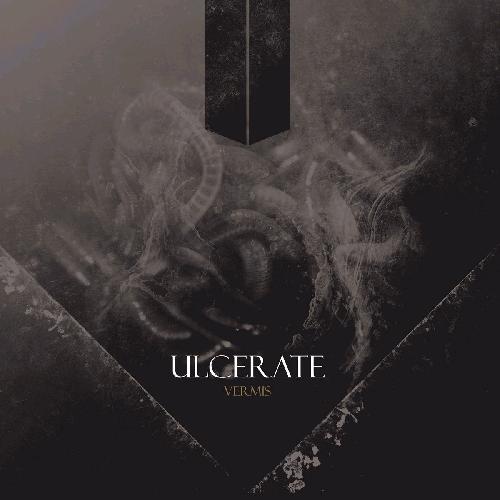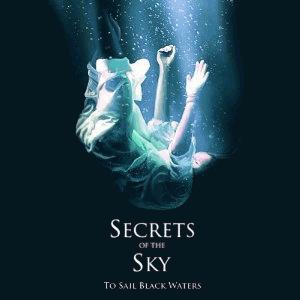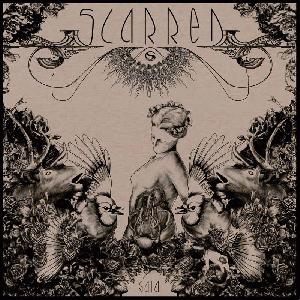 1. The Ocean – Pelagial
1. The Ocean – PelagialIn the wake of The Ocean’s polarizing duo Heliocentric and Anthropocentric, their next album was bound to be a make-or-break affair. With Pelagial, however, those fears about the Ocean’s future can finally be laid to rest. Based around the very cool concept of descending through the ocean, Pelagial feels more natural than anything else by the new lineup. Songwriter and guitarist Robin Staps’ original idea was to start with a clean, ambient “surface” feel and move steadily towards a “distorted and abrasive sound for the doomy depth-passages at the end of the album”. Indeed, the serene major-chord piano of “Epipelagic” sets a tone unlike anything in The Ocean’s catalogue, despite seascape sounds that otherwise whisper of Fluxion’s opener, “Nazca”.
Pelagial is intended to be a journey experienced in a complete listen, and as far as concept albums go, The Ocean have largely hit the nail on the head. Fans who are new to the band will find the album’s creative breadth intriguing, while long-time followers should be satisfied by the return of Staps’ ace songwriting chops and singer Loic Rossetti’s continued improvement in all areas. After six years of reassuring ourselves that Staps is still the guy who wrote Fluxion and Precambrian, The Ocean’s overhaul is finally paying dividends. Pelagial has the reconfigured band firing on all cylinders for the first time, and if it’s any indicator of future releases, then The Ocean still have a lot to say about the future of progressive metal.
There may not be a more
convincingly apocalyptic band than Ulcerate. Death metal groups constantly
promote themselves as “brutal” or “heavy” or “crushing,” but this New Zealand
trio has mastered the art of soul-withering songwriting by honing its craft on
a deeper level. Fitting together layers of dissonance in a way that makes sense
is a difficult task, since it often goes against established musical paradigms,
but it’s what Ulcerate thrives on. Due to the fact that every line on Vermis builds off this foundation, the album is
fundamentally saturated with intense emotions of utter dread and bitterness
towards a crumbling world. Welcome to Ulcerate’s perfect musical hell.
With regards to its back
catalogue, Ulcerate hasn’t really changed the game plan so much as ironed out
the kinks and come away with its most cohesive album to date. Vermis avoids the overwhelming nature of Everything is Fire, generally considered the band’s magnum opus,
while still having more than enough horsepower to satisfy the most brutal death
metal mongers. If they’re going to carve out a real legacy, then Hoggard,
Kelland, and Saint-Merat will inevitably have to change things up as all the
greats do. For now, however, Ulcerate has something special going and is
running away from the pack with their third phenomenal effort in a row. We may
all be only dust in the wind, but for just under an hour, Ulcerate are giving
us something with which to rejoice in that wondrous desolation.

Yes, Leprous is still
known for being “Ihsahn’s backing band.” But if it keeps this up, that’s going
to change in a hurry. With its fourth album, the Norwegian quintet has created
something truly its own, perhaps comparable to acts like Opeth and Enslaved,
but full of fresh intensity. There are moments that challenge you to wrap your
head around exactly what’s going on, and equally numerous times that you’ll be
swept away by anthemic choruses. Opener “Foe” revolves around a 7/4 time
signature as the instruments run circles around each other and refuse to settle
into a groove; the second half of “Chronic,” however, does the heavy lifting
for you as singer Einar Soldberg intones, “Stars, they lie where we can’t keep
them...” over and over, sharp guitar lines building behind him, the sound
growing in intensity despite an ever-slowing tempo. Many of the songs contain a
balance of styles as the band toys with the line between being soothing and
stimulating.
Coal aptly straddles two musical worlds of extremity and accessibility.
Rather than scaring away parents with shrieked onslaughts, Leprous prefer to
make listeners earn their reward with a record that refuses to be unlocked
quickly. Despite complex writing and untamed song structures, Coal has a knack for inviting successive listens
without becoming overbearing. That inspiration the band aimed for is definitely
on display here, as some ingenious moments throughout Coal’s fifty-five minutes unravel with a bit of
determination. Leprous is no longer someone’s sidekick. With its fourth album,
the band has shown not only talent and vision, but the patience to let those
qualities bring it to the fore of progressive metal where Leprous is proving it
belongs.
"You have no idea what to expect" – it’s the sort
of line a band throws on packaging to dare you to buy its album. Nine times out
of ten, the ploy works (and it’s exactly that, a ploy), but it’s that other ten
percent in which the real meat of modern metal lies. That's where Rorcal is
clawing its way up from, and for a beast like Rorcal, every road from
here on is the one not taken. The band’s third full-length, Világvége,
dropped in February and rattled even more cages than its predecessor. Comprised
of eight movements, it married the head-banging riffs of Rorcal’s early work to
the ominous doom metal of the band’s second album Heliogabolus for a more immediately engaging, but no less
powerful, experience.
Introductory combo “I” and “D” (part of a mangled lineup of
Roman numeral titles) build slowly and steadily with pounding chords and sparse
drumming, but all bets are off from there. Thunderous drumming and breakneck
riffs make Világvége an unrelenting
experience; its constantly shifting distorted harmonics at times bring to mind
the heaviest moments of Wolves in the Throne Room, or even the blast-furnace-esque
“Serpents” from Cave In’s post-hardcore thumper White Silence. Rorcal is becoming essential listening for those who
inhabit the macabre side of heavy metal – and with the band’s whole catalogue
available for free on their website, you now have every reason to leap into
that tantalizing black chasm.

Hailing from Brooklyn,
NY, Sannhet has managed to brew up a following the hard way. As in business,
initial investment pays dividends, and the post-black metal trio has parlayed
an intense touring schedule and wicked live show into a growing fan base in
only a few years. Sannhet’s debut album, Known Flood,
distills all of this work into a 45-minute barrage that falls somewhere between
early Isis and U.S. Black Metal acts like Krallice (whose guitarist Colin
Marston recorded the album). Known Flood is about as spot-on as any title could be: the songs here ebb and flow
from devastating metallic bursts to long periods of ambience and
percussion-driven interludes. Early cut “Invisible Wounds” begins with a
bizarre, spacey Sprechstimme piece that sounds like an incantation sung through
a box fan, then transitions suddenly into pounding tom-toms and guitar
distortion, in a fitting encapsulation of the album’s sound.
Despite being a
generally instrumental act, Sannhet fills the space normally occupied by vocals
admirably with impressionistic soundscapes. Set between a pair of seven-minute
behemoths, “Haunches” is a claustrophobic outburst that decompresses around the
three-minute mark into what sounds like an answering machine recording of a
train going through a windy mountain passage. Therein lies the beauty of Known Flood – Sannhet gives little concrete to hold onto,
but just enough for your imagination to complete the puzzle. Perhaps there’s
nothing particularly revelatory about mating Black Cascade to F♯ A♯ ∞, but Sannhet has come up with a consistently
engaging album in Known Flood.
Those who worship Neurosis and lament the incest of USBM will have a ball with
Sannhet, and really, Known Flood ought to be of interest to anyone who enjoys both the darkly intense and
avant-garde.

So what is one to expect from a band that consistently defies expectation? The only sure thing about Habitual Levitations was that it would be another crazy intellectual and emotional trip (and perhaps that, as photos of the band’s cannabis-littered notes showed, a fair amount of mind-altering substances were involved in its writing). Pre-release single “Milk Leg” hinted at a strong emphasis on rhythm and atmosphere and a continuation away from pounding metallic chords, yet before fans could mourn the loss of Intronaut’s heavy side, “The Welding” brought a fresh intensity, layering meticulous vocal harmonies over tightly-woven guitar lines en route to a charging climax.
Though Sacha Dunable and company have largely dropped harsh vocals for harmonized singing in the footsteps of Mastodon and Baroness, Habitual Levitations isn’t aiming to be so much accessible as universal. The subtly changing textures of “The Way Down” may be reminiscent of latter-day Isis – think “Stone to Wake A Serpent” – but by the end of the song, you’re left with a taste closer to John Coltrane’s transcendent improvisations than the raging of Godflesh. While Cynic and Opeth have fans grumbling about their lighter new directions, it’s hard to lament the way that Intronaut are going about their business. Music lovers no longer have an excuse to disregard metal as a whole for being too “angry” or “mindless”; Intronaut have been knocking on the door for years, and with Habitual Levitations they just might blow the roof off popular notions of what metal is capable of.
7. Secrets of the Sky – To Sail Black Waters
Hovering somewhere between My Dying Bride’s tortured overtures and Agalloch’s mellifluous black metal, To Sail Black Waters moves like a powerful beast – never at more than a crawl, but with tremendous momentum and poise. Though most of To Sail sits in largo-adagio tempos, Secrets’ two-part riffs play with the timing between percussion and guitar leads to draw the music forward. The main riff of “Winter” returns after a creepy whispered interlude (“I accept your gift great father / Speak to me deep in my sleep / For I shall carry out thine will / Every (every) whisper…”) to reestablish the song’s lurching groove, accompanied at various times by swirling lead guitar and layered howling. Secrets of the Sky isn’t doing anything revolutionary yet, but based on the early returns that’s probably for the best – it’s nice to hear a band focused on getting the finer points of its craft right instead of trying to invent a new one.
As a whole, the
songwriting on To Sail Black Waters is well-balanced and understated in the way that made bands like
Neurosis legends. While that may be setting an awfully high bar, Secrets of the
Sky already has a strong foundation and an album that gets better with each
listen. Though the band cites The Ocean, Opeth, Isis, and Agalloch as
inspirations, those names probably wouldn’t come to mind on first listen; they
are, however, good comparables in that large-scale composition skills and
dynamics control have been paramount to their success. To Sail Black Waters is among the more eminently listenable doom/sludge metal efforts of the
year, and makes it easy to forget that Secrets of the Sky is only in its third
year as a band.
8. Kalmah – Seventh Swamphony
Kalmah means “to the grave,” and the band lives up to its moniker by holding
nothing back on Seventh Swamphony. In
fact, there are several moments throughout the album that are bound to raise
eyebrows among even long-time fans. Following hot on the heels of the
blistering title track, “Deadfall” brings a new element to the band’s sound as
a full symphonic backing introduces the song’s bridge. The penultimate song of
the album, “Black Marten’s Trace,” breaks things up by opening with an ethereal
keyboard solo that wouldn’t sound out of place on a Nightwish album, and then
proceeds to lay down some of most vicious riffs in Kalmah’s recent discography.
Kalmah may never be accused of being the most visionary metal act, but the band
deserves credit for its approach to a genre largely content to recycle itself. From
its thunderous opening riff to the triumphant strut of closer “The Trapper,”
Seventh Swamphony is a solid and occasionally surprising affair
that’s worth a long look from fans of modern death and thrash metal. If 12 Gauge showed that Kalmah could still run with the
pack, then Seventh Swamphony finally has the band leading it.

There’s something about
three dudes in black capes and demon masks that just never gets old. It really
should, but it doesn’t as long as they've got the music to back it up. In stark
contrast to Swedish compatriot Ghost’s tongue-in-cheek doctrine, Terra
Tenebrosa legitimately gives the creeps with its genre-defying attack and
macabre imagery. The trio came together in 2009 from the ashes of post-hardcore
outfit Breach and delivered a promising debut, but it’s on their sophomore
effort that they’ve laid claim to territory all their own. Full of distorted
chants and screams, paranoia-inducing machine noises, and all sorts of other
bizarre sounds, The Purging is a tour de force in unsettling songcraft.
Terra Tenebrosa’s
organization of the whole exercise (see related: exorcise) is key. “The Redeeming Teratoma” opens with two
minutes of fuzzy synthesizer surrounded by horror-movie soundtrack noises, then
decompresses into the shifting polyrhythms of “The Compression Chamber” to
jump-start the album. On the other end, “Disintegration” restores order after
some creepy instrumental chicanery with a more straightforward structure,
rising from a hollowed-out bridge to a huge climax of layered guitar harmonies
and vocals that blend seamlessly into howling wind. Songs fade in and out,
pummeling riffs come and go, and the whole affair wraps up in a tidy 47 minutes
without once becoming stale. Crafting an album like The Purging is a tricky affair, but Terra Tenebrosa weaves
its incendiary compositions to maximum effect and makes sure that no element
outstays its welcome. That, perhaps more than anything, is what leads to the
success of The Purging, an
album that implies that not only is the well is still plenty deep, but the best
may be yet to come.
10. Scarred – Gaia/Medea
The inherent risk in sticking close to your influences is that no matter what you create, fans will compare you to multiple bands that that have done it before, and done it better. Scarred lists Meshuggah, Gojira, and Machine Head as prime influences on its death/thrash hybrid sound, but anyone who is likely to stumble across the group’s second album Gaia/Medea could probably figure that out within about ten seconds of the opening song’s first riff. It just so happens that Scarred is a rare example of that band that not only does its antecedents justice, but often outclasses their corresponding latest efforts. Fans of L’enfant Sauvage may cry foul and Unto the Locust’s proponents may beat their chest, but Gaia/Medea is a shot across the bow of the genre giants that puts Scarred at the foot of the tech-death podium.
Notable throughout Gaia/Medea is its old-school production, which focuses on creating a unified, organic feel rather than the sharp and mechanical sound typical of the genre. Despite this, individual lines remain crisp – “The Knot” opens and closes with a Scale the Summit-esque guitar line that sounds like it’s echoing around you in a huge stadium, while “Cinder” pitches and rolls on a sea of juxtaposing guitar and bass riffs. From its apocalyptic opening broadcast, Gaia/Medea is an impressively cohesive effort that sees Scarred re-envisioning rather than recycling the music that the album is patterned after. If you found Koloss solid but same-y and wish more bands didn’t suck at trying to replicate Vulgar Display of Power, then you may just love what Scarred has come up with on Gaia/Medea.
11. Deafheaven – Sunbather
12. Gris – À l'Âme Enflammée, l'Äme Constellée
12. Shade Empire – Omega Arcane
13. Gorguts – Colored Sands
15. Carcass – Surgical Steel
16. Dillinger Escape Plan – One of Us is the Killer
17. Exhumed – Necrocracy
18. Cult of Luna – Vertikal
19. Locktender – Kafka
20. Scale the Summit – The Migration
21. Caldan Brood – Echoes of Battle
22. Light Bearer – Silver Tongue
23. The Ruins of Beverast – Blood Vaults
24. Haken – The Mountain
25. KEN Mode – Entrench
26. Tidal Arms – Tidal Arms
27. Paysage D’hiver – Das Tor
28. SubRosa – More Constant Than the Gods
29. Soilwork – The Living Infinite
30. Nine Inch Nails – Hesitation Marks
31. Oblivion – Called to Rise
32. Oranssi Pazuzu – Velonielu
33. Svart Crown – Profane
34. Darkthrone – The Underground Resistance
35. Revocation – Revocation
36. Černá – Restoring Life
37. Transient – Transient
38. The Guilt Of… – Isolation Room
39. Agnes Vein – Soulship
40. Cicada the Burrower – Despoina
41. Obliteration – Black Death Horizon
42. Altar of Plagues – Teethed Glory and Injury
43. Mastodon – Live at Brixton
12. Shade Empire – Omega Arcane
13. Gorguts – Colored Sands
15. Carcass – Surgical Steel
16. Dillinger Escape Plan – One of Us is the Killer
17. Exhumed – Necrocracy
18. Cult of Luna – Vertikal
19. Locktender – Kafka
20. Scale the Summit – The Migration
21. Caldan Brood – Echoes of Battle
22. Light Bearer – Silver Tongue
23. The Ruins of Beverast – Blood Vaults
24. Haken – The Mountain
25. KEN Mode – Entrench
26. Tidal Arms – Tidal Arms
27. Paysage D’hiver – Das Tor
28. SubRosa – More Constant Than the Gods
29. Soilwork – The Living Infinite
30. Nine Inch Nails – Hesitation Marks
31. Oblivion – Called to Rise
32. Oranssi Pazuzu – Velonielu
33. Svart Crown – Profane
34. Darkthrone – The Underground Resistance
35. Revocation – Revocation
36. Černá – Restoring Life
37. Transient – Transient
38. The Guilt Of… – Isolation Room
39. Agnes Vein – Soulship
40. Cicada the Burrower – Despoina
41. Obliteration – Black Death Horizon
42. Altar of Plagues – Teethed Glory and Injury
43. Mastodon – Live at Brixton
44. Kylesa – Ultraviolet
45. Ihsahn – Das Seelenbrechen
46. Shai Hulud – Reach Beyond the Sun
47. In Vain – AEnigma
48. Echoes of Eon – Immensity
49. Pelican – Forever Becoming
50. Suffocation – Pinnacle of Bedlam
45. Ihsahn – Das Seelenbrechen
46. Shai Hulud – Reach Beyond the Sun
47. In Vain – AEnigma
48. Echoes of Eon – Immensity
49. Pelican – Forever Becoming
50. Suffocation – Pinnacle of Bedlam













No comments:
Post a Comment